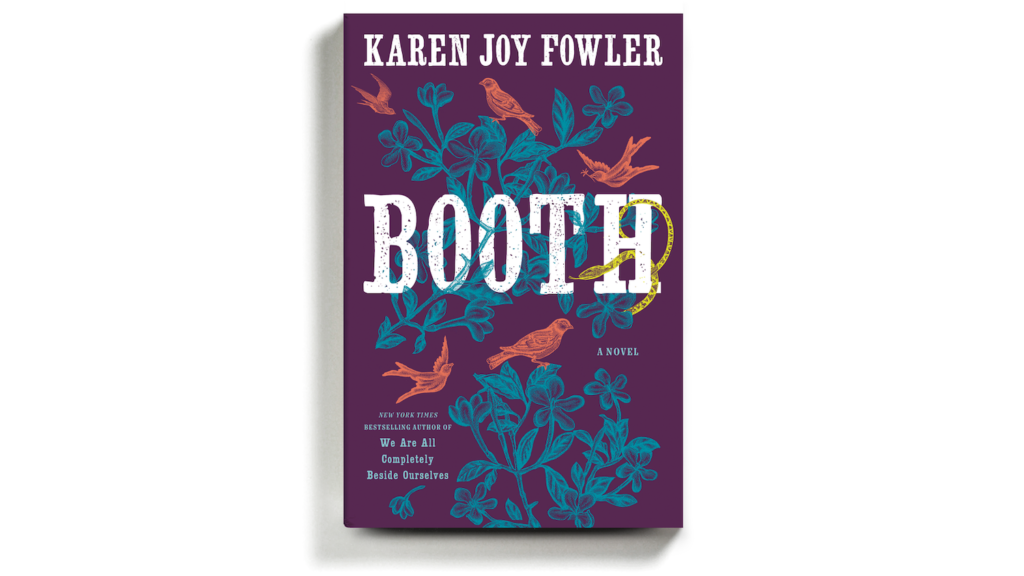As a journalist, I have an uneasy relationship with historical fiction. It makes me queasy, nearly dizzy, when facts in an article are blurred with fiction and opinion to the point which only the most expert, dedicated investigator can tickle out the difference. But with a novel like Booth (Penguin Random House), written by Man Booker finalist and PEN/Faulkner award-winning author Karen Joy Fowler in hand, half of that tension disappears.
Fowler’s research process into the time period and family of Lincoln assassin John Wilkes Booth was as rigorous as an athlete’s Olympic training. As in her prior work in best-selling science fiction, fantasy novels, and short story collections, it’s always clear how she slices and dices the narrative pie. In interviews and in the book’s afterword and acknowledgements chapter, Fowler makes explicit that Booth’s research process included reading vast amounts of published and archival material. She visited museums and even Tudor Hall, a home built by the family’s patriarch and located on Booth farmland.
The result is a project that explores 19th century politics, culture, moral divisions, racism, slavery, Victorian-era gender bias—all seen primarily through the lens of the dynastic battles and dynamics of siblings and parents in a deeply troubled household. “Genteel” alcoholism and drug abuse, gun violence, jealousy, celebrity culture, systemic injustice, vegetarianism, mental illness, and Black family life in the 1800s dance on the perimeters of its central story. The book’s main line focuses less on the best-known Booth to examine the rest of his family—and in so doing, feels intensely contemporary.

Readers learn that family patriarch Junius Brutus Booth was a Shakespearean actor. His performances of Richard III were mythologized; applauded mightily on the occasions his outrageous drinking habits do not reduce him to utter embarrassment. His sudden absences from the family and his indiscretions that end in bigamy leave John Wilke, his mother, and siblings spinning like dervishes. Mom is depressed, his eldest sister Rosalie horrifically shy, his brother Edwin an alcoholic knockoff of their father. The family’s most talented actor, the enticing sister Asia, is steely, wickedly charming, and emotionally volatile.
But when Congress passes the 13th Amendment to abolish slavery and General Lee surrenders to end the Civil War, John Wilke implodes and moves to the frontline of the novel. His Southern sympathies tilt precariously toward violence as a means to preserve slavery and achieve notoriety. Fowler allows him at last to claim center stage in the novel’s climax, which was written long before Fowler ever considered writing about the famous assassin’s family.
While reading the book, I found myself forgetting, or at least setting aside, the son whose claim to fame as a white supremacist robbed our country of one of its deepest presidential thinkers. Siblings Rosie, Edwin and Asia open into complex characters that, had they not been members of the Booth family, would still have been intriguing subjects. Perhaps because we already know “the end” of this yarn, and because Fowler doesn’t cast judgement on the characters, it’s possible to surrender to the fascinations of people who for the most part, struggled and triumphed outside the spotlight.
Booth serves up as pleasurable-to-read side dishes about the Dred Scott case and the John Brown uprising, both of which demonstrate Lincoln’s dignified purpose and principles in office. I found myself conducting extracurricular research on the time period—not so much to test the accuracy of Fowler’s account, but due to reawakened interest in the history of this country and the justice it continues to lack.
With populism, fanaticism, systemic racism, mass shootings, and wars raging in today’s world, it’s nearly impossible to maintain hope for the future. With Booth, Fowler suggests there is opportunity to learn from the past in order to move to a more ethical, peaceful, and moral future. With that, historical fiction gains traction on my bookshelf, although I admit, our relationship remains uneasy.
Help us save local journalism!
Every tax-deductible donation helps us grow to cover the issues that mean the most to our community. Become a 48 Hills Hero and support the only daily progressive news source in the Bay Area.
Purchase Booth here.





